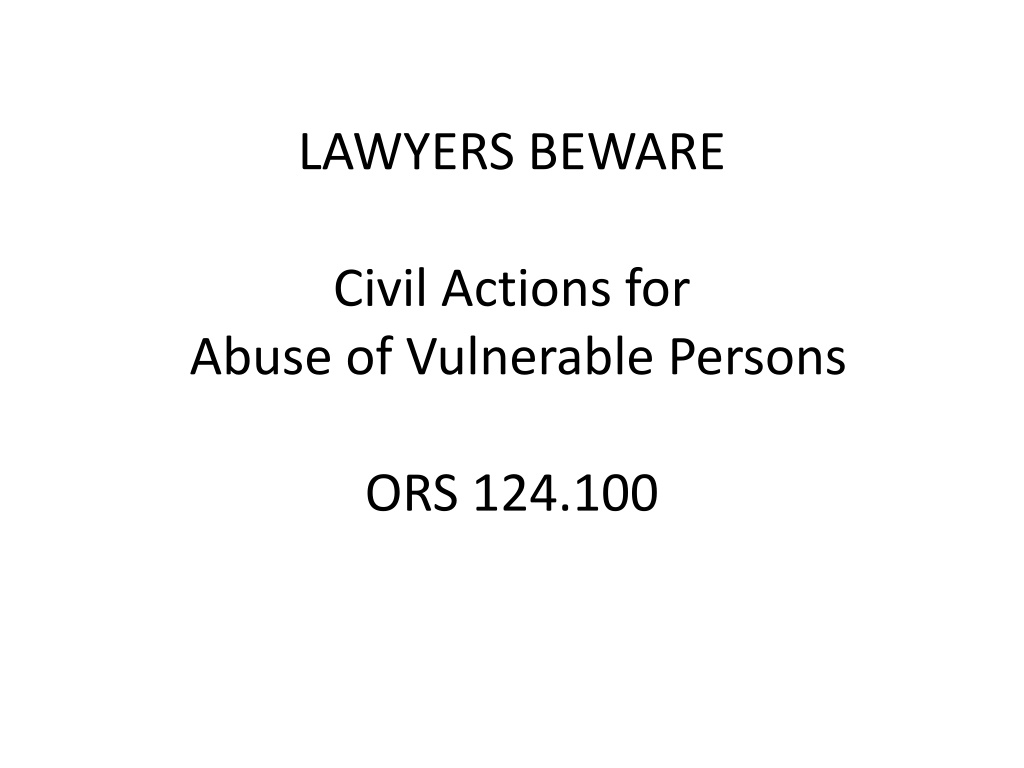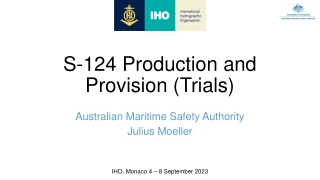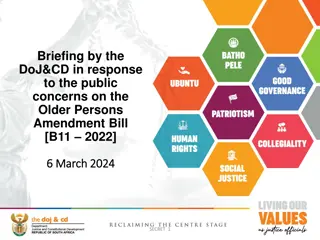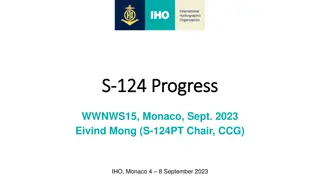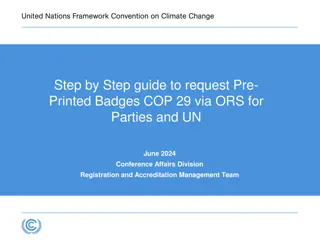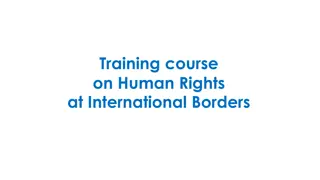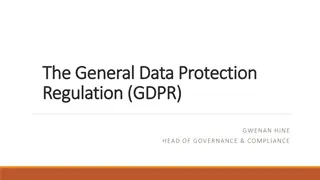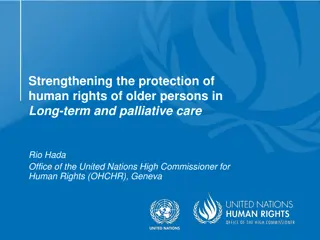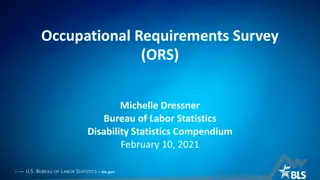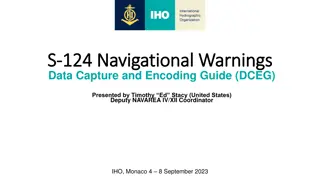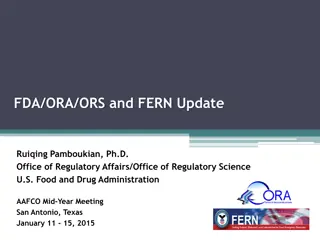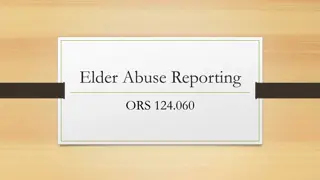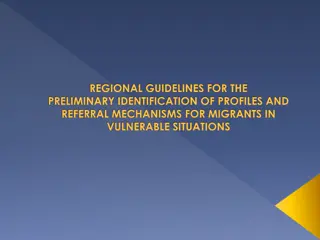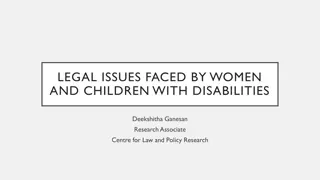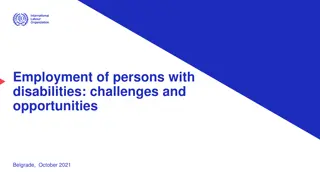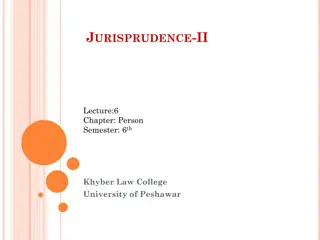Legal Protection for Vulnerable Persons: Understanding ORS 124.100
Exploring ORS 124.100, this content delves into civil actions against abuse of vulnerable persons, the definition of vulnerable individuals, and the implications for lawyers and clients. It highlights the legal recourse available for elderly, financially incapable, incapacitated, and disabled persons who have suffered physical or financial abuse, emphasizing the importance of safeguarding their well-being.
Uploaded on Sep 26, 2024 | 0 Views
Download Presentation

Please find below an Image/Link to download the presentation.
The content on the website is provided AS IS for your information and personal use only. It may not be sold, licensed, or shared on other websites without obtaining consent from the author. Download presentation by click this link. If you encounter any issues during the download, it is possible that the publisher has removed the file from their server.
E N D
Presentation Transcript
LAWYERS BEWARE Civil Actions for Abuse of Vulnerable Persons ORS 124.100
ORS 124.100 A POWERFUL TOOL FOR THE PROTECTION OF THE ELDERLY AND THE VULNERABLE or A SERIOUS HEADACHE FOR LAWYERS AND CLIENTS
ORS 124.100(2) A vulnerable person who suffers injury, damage or death by reason of PHYSICAL ABUSE or FINANCIAL ABUSE may bring an action against any person who has caused the physical or financial abuse or who has permitted another person to engage in physical or financial abuse:
ORS 124.100(5) An action may be brought under this section against a person for permitting another person to engage in physical or financial abuse if the person knowingly acts or fails to act under circumstances in which a reasonable person should have known of the physical or financial abuse.
Who Is A Vulnerable Person? ORS 124.100(g) An Elderly Person (65 years old or older); A Financially Incapable Person; An Incapacitated Person; or A person with a disability who is susceptible to force, threat, duress, coercion, persuasion, or emotional injury because of the person s physical or mental impairment.
FINANCIALLY INCAPABLE Financially incapable means a condition in which a person is unable to manage financial resources of the person effectively for reasons including, but not limited to, mental illness, mental retardation, physical illness or disability, chronic use of drugs or controlled substances, chronic intoxication, confinement, detention by a foreign power or disappearance. Manage financial resources means those actions necessary to obtain, administer and dispose of real and personal property, intangible property, business property, benefits and income. ORS 125.005
INCAPACITATED PERSON Incapacitated means a condition in which a person s ability to receive and evaluate information effectively or to communicate decisions is impaired to such an extent that the person presently lacks the capacity to meet the essential requirements for the person s physical health or safety. Meeting the essential requirements for physical health and safety means those actions necessary to provide the health care, food, shelter, clothing, personal hygiene and other care without which serious physical injury or illness is likely to occur. ORS 125.005
ORS 124.105 Defines Physical Abuse Assaults, Reckless Endangerment, Sex Crimes or Criminal Mistreatment. May also include: Depravation of food and water; Use of Physical or Restraints to punish; or Use of Meds for purposes other than authorized by a physician.
ORS 124.110 Defines Financial Abuse (1) An action may be brought under ORS 124.100 for financial abuse in the following circumstances: (a) When a person wrongfully takes or appropriates money or property of a vulnerable person, without regard to whether the person taking or appropriating the money or property has a fiduciary relationship with the vulnerable person. (b) When a vulnerable person requests that another person transfer to the vulnerable person any money or property that the other person holds or controls and that belongs to or is held in express trust, constructive trust or resulting trust for the vulnerable person, and the other person, without good cause, either continues to hold the money or property or fails to take reasonable steps to make the money or property readily available to the vulnerable person when: (A) The ownership or control of the money or property was acquired in whole or in part by the other person or someone acting in concert with the other person from the vulnerable person; and (B) The other person acts in bad faith, or knew or should have known of the right of the vulnerable person to have the money or property transferred as requested or otherwise made available to the vulnerable person. (c) When a person has at any time engaged in conduct constituting a violation of a restraining order regarding sweepstakes that was issued under ORS 124.020. (2) A transfer of money or property that is made for the purpose of qualifying a vulnerable person for Medicaid benefits or for any other state or federal assistance program, or the holding and exercise of control over money or property after such a transfer, does not constitute a wrongful taking or appropriation under subsection (1)(a) of this section or the holding of money or property without good cause for the purposes of subsection (1)(b) of this section.
ESTOPPLE BASED ON CRIMINAL CONVICTION ORS 124.140 A defendant convicted in any criminal proceeding of conduct that gives rise to a cause of action under ORS 124.100 is estopped from denying the conduct for purposes of an action under ORS 124.100 to 124.140.
WHO GETS TO SUE? ORS 124.100(3) (a) A vulnerable person; (b) A guardian, conservator or attorney-in-fact for a vulnerable person; (c) A personal representative for the estate of a decedent who was a vulnerable person at the time the cause of action arose; or (d) A trustee for a trust on behalf of the trustor or the spouse of the trustor who is a vulnerable person.
WHO IS NOT AMENABLE TO SUIT ORS 124.115 (a) Financial institutions, as defined by ORS 706.008; (b) A health care facility, as defined in ORS 442.015; (c) Any facility licensed or registered under ORS chapter 443; or (d) Broker-dealers licensed under ORS 59.005 to 59.541. UNLESS (a) The person is convicted of one of the crimes specified in ORS 124.105 (1); or (b) The person engages in conduct constituting financial abuse as described in ORS 124.110, and the person is convicted of a crime by reason of the conduct.
DONT FORGET THE AG The Attorney General MUST serve a copy of the Complaint on the Attorney General within 30 days after the action is commenced. ORS 124.100(6)
A BIG STICK ORS 124.125 (1)The AG, DHS or the DA may bring an independent action and shall be awarded the costs of investigation and penalties. Penalties may not exceed $25,000 per occurrence. (2)The AG may intervene in any civil action under ORS 124.100
INTERROGATORIES TOO? ORS 124.125(3) The AG or DA may serve an investigative demand to any person who is believed to have info, documents or physical evidence. The AG or DA can compel: -Sworn Testimony -Answers to Written INTERRAGOTORIES -The Production of Documents and Things.
STATUTE OF LIMITATIONS ORS 124.130 7 YEARS An action under ORS 124.100 to 124.140 must be commenced within seven years after discovery of the conduct described in ORS 124.105 and 124.110 that gives rise to a cause of action under ORS 124.100 to 124.140.
WHATS AT STAKE? ORS 124.100(2) The court shall award the following to a plaintiff who prevails in an action under this section: (a) An amount equal to three times all economic damages, as defined in ORS 31.710, resulting from the physical or financial abuse, or $500, whichever amount is greater. (b) An amount equal to three times all noneconomic damages, as defined by ORS 31.710, resulting from the physical or financial abuse. (c) Reasonable attorney fees incurred by the plaintiff. (d) Reasonable fees for the services of a conservator or guardian ad litem incurred by reason of the litigation of a claim brought under this section.
TRIPLE DAMAGES? REALLY? Herring v. Am. Med. Response Nw., Inc., one of the consolidated cases heard by the Court of Appeals prior to Wyers, found that tripling the noneconomic damages award did not violate the $500,000 cap on noneconomic damages under the statute that generally allows such damages; and tripling the noneconomic damages award did not violate due process. 255 Or. App. 315, 297 P.3d 9 (2013)
REMEDIES NOT EXCLUSIVE ORS 124.135 The remedies provided by ORS 124.100 to 124.140 are in addition to any other remedy, civil or criminal, that may be available under any other provision of law.
BURDEN OF PROOF Church v. Woods 190 Or. App. 112 (2003) A statutory claim for financial abuse, under 124.110(a), has four elements, there must be: (1) a taking or appropriation; (2) of money or property; (3) that belongs to an elderly or incapacitated person; and (4) the taking must be wrongful.
WRONGFUL Taking is wrongful if carried out in pursuit of improper motive or by improper means. See Church.
Hoffart v. Wiggins 226 Ore. App. 545 ORS 124.110(1)(b), BAD FAITH retention of funds is actionable. No proof of Wrongful Taking required. The Court deciding Hoffart v. Wiggins held that the action did not require a vulnerable couple to prove that broker wrongfully took or appropriated the money, and whether investment broker acted in bad faith in retaining any monies belonging to vulnerable couple was a jury question. Hoffart v. Wiggins, 226 Or. App. 545, 204 P.3d 173 (2009)
FOOD FOR THOUGHT AND FUEL FOR NIGHTMARES Ireland v. Ireland 11CV0058CC Plaintiff Uncle and Defendant Nephew were both shareholders in a trucking corporation. Plaintiff Uncle (a minority shareholder) disagreed with the decision made by Defendant Nephew (a majority shareholder) to reinvest capital into the company, rather than disburse dividends. Uncle filed a financial abuse claim under ORS 124.110, alleging that Plaintiff Uncle was a vulnerable person under that statute, and that the reinvestment was a bad faith, wrongful taking under that statute. Plaintiff Uncle requested economic damages in the amount of $21,750,000 and noneconomic damages in the amount of $300,000, noting that those damages must be trebled and attorney fees awarded pursuant to ORS 124.100(2). The case settled shortly after Judge Garrison denied summary judgment as to that claim, stating that the statute was broad enough to support that claim.
Wyers v. Am. Med. Response Nw., Inc. involved a plaintiff who was abused by a paramedic in an ambulance en route to the hospital. The Court held the vulnerable persons statute did not require ambulance company s actual knowledge of the abuse; vulnerable persons statute rendered liable defendant who was aware of any abuse committed by other person, rather than only defendant who was aware of specific incident of abuse committed upon plaintiff; and a genuine issue of material fact existed regarding whether provider knowingly scheduled paramedic to work under circumstances in which reasonable person should have known that physical abuse would occur. 360 Or. 211, 377 P.3d 570 (2016).
HYPOTHETICALS by Caso & Acosta Hypothetical No. 1 Your 87 year old neighbor Sadie has been diagnosed with Alzheimer s Disease but maintains that she is doing fantastic. Although she is always upbeat and smiling, she is unable tell you the name of the current president or her own cat s name. This morning you noticed an eviction notice posted to her front door and are worried about her. When Sadie is outside weeding her flowerbed, she mentions, to you, that she recently bought a $2 million luxury home in Sunriver that she plans on sharing with her daughter and son-in-law. She does not seem to understand the notice affixed to her front door. Do you have a duty to report elder abuse?
Hypothetical No. 2 83 year old Channing was in a coma when his family members obtained his power of attorney and sold and/or disposed of all of his assets. They were sure he wouldn t survive. All of the proceeds were distributed to Channing s relatives or favorite charities. Channing awoke from his coma with no home and no money. He waited in the hospital long after he needed to because there was no appropriate discharge plan. Channing has come to your office to consult about what he should do next. Do you have a duty to report elder abuse?
Hypothetical No. 3 Over lunch, your law school friend Carl, whom you represent in a bankruptcy, mentions that he is being paid $900 per month by the state to care for his 93 year old mom, Mary. Carl explains that Mary is at home recovering from a broken hip. Carl mentions that he has recently started investing in Beanie Babies with the money he receives from the state. You remember meeting Mary at Thanksgiving last year at Carl s house. Do you have a duty to report?
